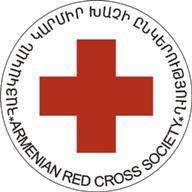
Institutional development
In 2021, the ARCS, in cooperation with the International Committee of the Red Cross and the International Federation of the Red Cross/Red Crescent, launched a large-scale development program of the organization; a three-year development plan was drawn up and response to priority development issues was implemented.
The basis of the project is the provision of equal opportunities for institutional development for all regional branches. Material and human capacity building measures are implemented in all regional branches. In particular, as a result of the actions outlined in the Program, the Ararat, Kotayk, Armavir, and Aragatsotn regional branches of the ARCS were equipped with the necessary computer equipment and furniture, and cars were provided to the branches in order to
facilitate the implementation of humanitarian activities in hard-to-reach areas. A number of activities are organized for employees and volunteers (trainings, round table meetings/discussions), the aim of
which is to strengthen and improve their soft/hard skills and abilities (competencies) in the direction of effective management, presentation, monitoring and accountability of implemented programs. And the implementation of small grant initiatives implemented in the communities of marzes strengthens the knowledge acquired by the staff and volunteers in the direction of identifying and responding to needs.
During the year, training courses are regularly organized for about 500 volunteers on First Aid, Response to Emergency Situations, Restoration of Family Links, Specifics of Working with Children and the Elderly.
About 400 volunteers are insured against accidents in cooperation with the IFRC.
Branch Forums are organized twice a year with the participation of the leadership of the ARCS and the management staff of all regional branches. During the conferences, the activities, achievements and challenges of the previous semester are summarized.
Currently, the ARCS is strengthening its digital capabilities and integrating a number of institutional tools, particularly in the areas of Community Engagement and Accountability, feedback mechanisms and information management.
From 2021, the development of the Education Direction was initiatied, the purpose of which is to coordinate and more effectively implement the programs related to non-formal education, as well as to
support the access to education for children during emergency situations.
Development of branches
Capacity development of regional branches of Tavush, Gegharkunik, Syunik and Vayots Dzor
In cooperation with ICRC and within the framework of a complex capacity development program, the staff and volunteers of Tavush, Gegharkunik, Vayots Dzor and Syunik regional branches get the opportunity to improve their skills and abilities in the direction of highlighting the needs of communities, implementing response programs, expanding cooperation and developing new approaches. Various trainings are organized annually for staff and volunteers. Volunteer initiatives are also important components of the program. Volunteer initiatives are developed and implemented by regional volunteers, which aim to promote the application of theoretical knowledge in practice.
In total, more than 50 programs are implemented in 17 communities of 4 marzes of RA for children, single elderly and disabled, women with limited opportunities and other vulnerable groups.
Capacity building of regional branches of Ararat, Aragatsotn, Kotayk, Armavir, Gegharkunik, Syunik and Tavush through food assistance program
Within the framework of regional branch development programs funded by the Swiss Red Cross the branch needs assessment, response to problems and project management capabilities are improved.
Since 2017, the project has been running a charity canteen in the city of Masis, Ararat region, providing hot meals 3 times a week to 110 single elderly people. In other regions, food packages are provided to a
total of 550 vulnerable elderly people every month and sanitary packages are provided every quarter.
Volunteers organized socialization events for the beneficiaries of the project, and congratulated and handed out gifts on their birthdays. The program also had a staff and volunteer capacity building component, as part of which the involved staff and volunteers participated in training on program management, resource mobilization, and the specifics of elder care. Starting from 2021, the program received funding in the months of January-April and November-December. In 2022 the program is also being implemented in Syunik Region, providing support to 70 elderly beneficiaries.